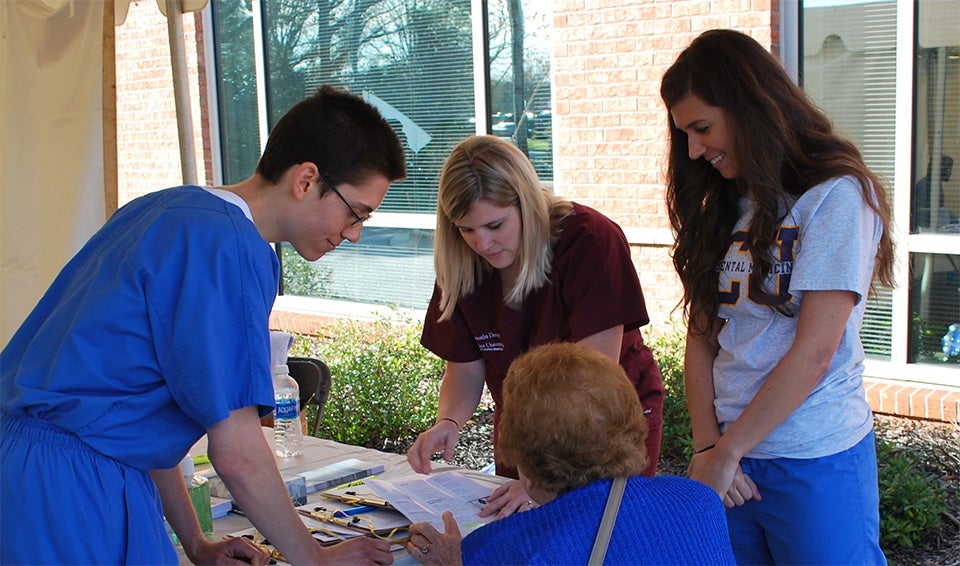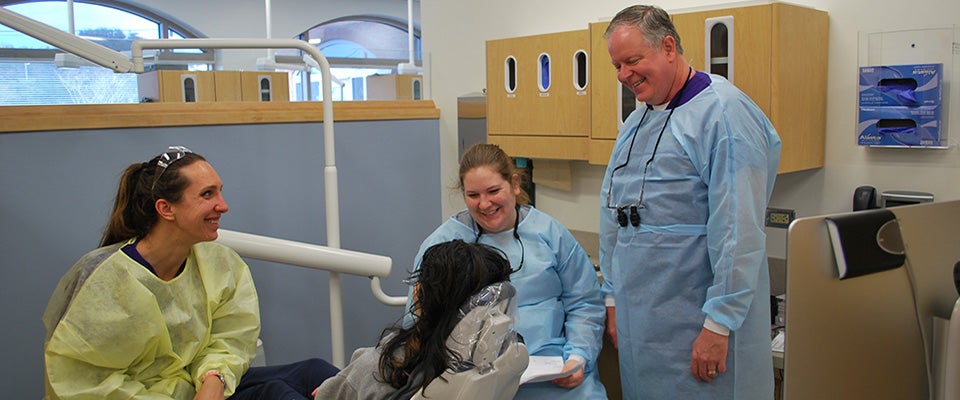ECU SMILES
Partnership brings dental care to Elizabeth City adults
East Carolina University’s School of Dental Medicine hosted an inaugural charity event March 18-19 designed to reach adults in the greatest need of oral health care.
A new initiative for the school, “ECU Smiles” was held at the university’s community service learning center in Elizabeth City – one of eight dental education and care clinics operating in rural and underserved areas across the state. The effort marks another way to advance the school’s mission of supporting North Carolinians who suffer from a lack of access to primary health care services.
An interprofessional team of community and ECU health care professionals – including nursing students, dental residents and students, and faculty – guided 65 patients through medical screening and referrals for hypertension and diabetes, dental radiography, examination and diagnosis, restorative and surgical dental services at the state-of-the-art facility.
“Our ECU health sciences professionals and students are veterans in volunteerism,” said Dr. Michael Scholtz, assistant dean for extramural clinical practices in dental medicine. “They are heavily involved in these types of events across the state, but this is the first such clinic offered by our school.”
Dr. Carol Anderson, faculty director of the Elizabeth City community service learning center, said there are many reasons why people neglect their teeth. Some have bad memories of dental visits from childhood. Others simply put off dental visits until the situation is dire. Often, it comes down to money.
“Dental care is not inexpensive,” said Anderson. “Some people have to choose between putting food on table and paying for dental work.”
Anderson said people often ask why care the learning center isn’t free, since fourth-year students and dental residents are the primary providers.
“I respond by saying that the students and residents are highly skilled, and it’s expensive to educate them. Also, the centers have to become economically sustainable if they want us to do our part in relieving the shortage and maldistribution of dentists long-term,” she said.
The school’s eight learning centers across the state and clinics at ECU do offer reduced fees, payment plans and accept dental Medicaid.
Access to care is another problem: North Carolina ranks 47th nationally in the number of dentists per capita. Eighty of North Carolina’s 100 counties are considered rural. Those rural counties contain 40 to 50 percent of the state’s population but, on average, rural counties have half the number of dentists per 10,000 people as urban counties.
Pasquotank County Commissioners Cecil Perry and Bettie Parker visited ECU Smiles on Saturday. Dr. Greg Chadwick, dean of the dental school, told them that about 50 percent of patients served by the Elizabeth City center use Medicaid, which remains critical to its economic sustainability.
Anderson said there are only two other providers in Elizabeth City who accept dental Medicaid. And Scholtz estimated that since opening in 2013, the Elizabeth City center has provided in excess of $1.5 million in care through the dental Medicaid program.
Chadwick asked the commissioners to remind legislators that it is ECU’s mission to assist the state in resolving access to care issues, but we cannot do it alone.
Partnerships were also crucial to the execution of ECU Smiles, and Scholtz said local entites were essential in “identifying and contacting the patients…and reaching those most in need in their community.”
ECU and the College of Albemarle nursing students targeted patients who were in need of hypertension and diabetes screening, referrals and education. Albemarle Regional Health Services and the Community Care Clinic in Elizabeth City evaluated patients’ financial barriers and provided language interpreters.
Sentara Albemarle Medical Center, who owns land next to the learning center, assisted with logistics. Pasquotank County Emergency Medical Services provided teams both days, and local restaurants provided lunches for the many volunteers. The Elizabeth City Police Department, a local pharmacy, and other community stakeholders were all key players in making the event successful.
With the community service learning centers now in Ahoskie, Elizabeth City, Brunswick County, Davidson County, Lillington, Robeson County, Spruce Pine, and Sylva, the school hopes to offer ECU Smiles at their other locations across the state in the future.
“The cost of ECU Smiles in dollars and cents is substantial, but its value to patients suffering from poor oral health can’t be measured,” said Scholtz. “At this point, we don’t know how often we’ll be able to offer ECU Smiles. We do know, however, that committed local partners are the key.”

ECU dental students David Morrison, Ali Denny and Madison Smith were part of the team that registered individuals to become patients at ECU Smiles.
